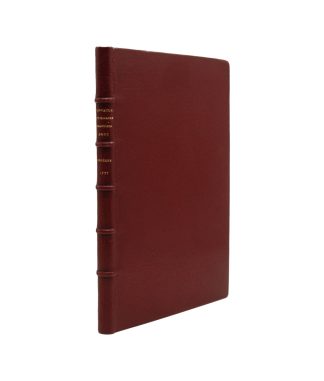TRIPPAULT, Léon.
Dictionaire François-Grec..
Orléans, chez Eloi Gibier, Libraire & Imprimeur de l\\\\\\\'Vniuersité, 1577£8,750.00
FIRST EDITION. 8vo. pp. [iv] 76 (i.e.78) [ii]: a4, A-K4. Greek and Roman letter, some Italic. Woodcut initials, head pieces and ornaments. A fine copy, crisp and clean, in beautiful mid C19th crimson morocco ‘Janseniste’ by Hardy, spine with raised bands, inner dentelles richly gilt, edges double gilt ruled, combed marbled endpapers, a.e.g.
Exceptionally rare first edition, and a fine copy, beautifully bound by Hardy, of this French Greek dictionary published in Orleans, relating to the etymology of French words derived from the Greek. Léon Trippault, sieur de Bardis, was a lawyer in Orléans and one of the first authors to contemplate the origin of the French language; he was convinced of the Greek origin of French and tried to prove it through a series of works including this dictionary in which he traces French words back to Greek. His thesis had its basis in the myth that France’s first kings came from Greece, or that France was named for Francion, a son of Hector, who escaped the sack of Troy. Henri Estienne similarly looked for Greek origins for the French language, assimilating the glory of Classical Athens with sixteenth-century France.
“In the 16th century, the history of the French language served as primary evidence in the history of French institutions. The history of those institutions was itself crucial to the debate on the role of the monarchy, which in turn related to the Wars of Religion. French clearly had close affinity to Latin, and thus to Italian and Spanish. However, humanist admiration for Greek, Reform interest in Hebrew, and concurrent bursts of celtomania and xenophobia led to theories about the origin of the French language that resolutely pursued the implausible. The thesis that French had Greek origins was supported by a number of Classical and biblical sources (Léon Trippault provided a summary in an appendix to his Celt hellenisme, ou etymologic des mots francois tirez du graec. Plus. Preuves en general de la descente de nostre langue, 1580). Many historians of French claimed that the Gauls spoke Greek or some closely related language. In this way, native gallican interests could be allied with the most prestigious of the ancient languages (and opposed to Italian/Latin). This linkage took on political significance in works, such as François Hotman’s Franco–gallia (1573), in which evidence from diachronic linguistics was adduced to provide an historical basis for elected, constitutional monarchy and customary law, as opposed to divine-right absolute monarchy and Roman law. At the same time, other scholars sought to establish links between Hebrew and French. Guillaume Postel .. provided a basis for this work, which received occasional mention in the works of Joachim Perion (Dialogorum de linguae Gallicœ origine, eiusque cum Grœca cognatione, libri quatuor, 1555) and Trippault, and culminated in Estienne Guichard’s L’harmonie étymologique … Such historical evidence was necessarily impressionistic, generally based on word-lists of fewer than 500 entries (Joachim Perion, Léon Trippault). The dangers of basing such conclusions on small lists of words led the more linguistically sophisticated Henri Estienne to argue not for a Greek origin of French, but rather closer affinity between constructions of modern French with ancient Greek (Traicté de la conformité du langage françois avec le grec, 1565).” D.A. Kibbee. ‘Renaissance Linguistics: French Tradition.’
A fine copy of this beautifully printed, and very rare little dictionary.
USTC 56795. Louis Desgraves, ‘Répertoire bibliographique des livres imprimés en France au seizième siècle’ vol. 10, p. 56, 252. Not in Adams.In stock









